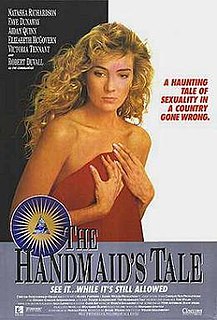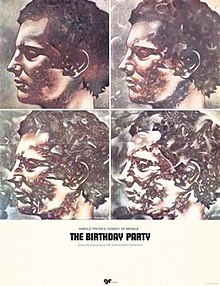The Theatre of the Absurd is a post–World War II designation for particular plays of absurdist fiction written by a number of primarily European playwrights in the late 1950s, as well as one for the style of theatre which has evolved from their work. Their work focused largely on the idea of existentialism and expressed what happens when human existence has no meaning or purpose and therefore all communication breaks down. The structure was in a round shape and the finishing point was the same as the starting point. Logical construction and argument give way to irrational and illogical speech and to its ultimate conclusion, silence.

Harold Pinter was a British playwright, screenwriter, director and actor. A Nobel Prize winner, Pinter was one of the most influential modern British dramatists with a writing career that spanned more than 50 years. His best-known plays include The Birthday Party (1957), The Homecoming (1964), and Betrayal (1978), each of which he adapted for the screen. His screenplay adaptations of others' works include The Servant (1963), The Go-Between (1971), The French Lieutenant's Woman (1981), The Trial (1993), and Sleuth (2007). He also directed or acted in radio, stage, television, and film productions of his own and others' works.

Joseph Walton Losey III was an American theatre and film director, producer, and screenwriter. Born in Wisconsin, he studied in Germany with Bertolt Brecht and then returned to the United States. Blacklisted by Hollywood in the 1950s, he moved to Europe where he made the remainder of his films, mostly in the United Kingdom. Among the most critically and commercially successful were three films with screenplays by Harold Pinter, The Servant (1963), Accident (1967) and The Go-Between (1971).

The Dumb Waiter is a one-act play by Harold Pinter written in 1957.

Accident is Harold Pinter's 1967 British dramatic film adaptation of the 1965 novel by Nicholas Mosley. Directed by Joseph Losey, it was the second of three collaborations between Pinter and Losey, the others being The Servant (1963) and The Go-Between (1970). At the 1967 Cannes Film Festival, it won the award for Grand Prix Spécial du Jury. It also won the prestigious Grand Prix of the Belgian Film Critics Association.
Amicus Productions was a British film production company, based at Shepperton Studios, England, active between 1962 and 1977. It was founded by American producers and screenwriters Milton Subotsky and Max Rosenberg.

The Servant is a 1963 British drama film directed by Joseph Losey. It was written by Harold Pinter, who adapted Robin Maugham's 1948 novella. The Servant stars Dirk Bogarde, Sarah Miles, Wendy Craig and James Fox. It opened at London's Warner Theatre on 14 November 1963.

The Birthday Party (1957) is the second full-length play by Harold Pinter, first published in London by Encore Publishing in 1959. It is one of his best-known and most frequently performed plays.

Patrick George McGee, known professionally as Patrick Magee, was a Northern Irish actor and director of stage and screen. He was known for his collaborations with Samuel Beckett and Harold Pinter, as well as creating the role of the Marquis de Sade in the original stage and screen productions of Marat/Sade. He also appeared in numerous horror films and in two Stanley Kubrick films, A Clockwork Orange and Barry Lyndon.

The Handmaid's Tale is a 1990 dystopian film adapted from Canadian author Margaret Atwood's novel of the same name. Directed by Volker Schlöndorff, the film stars Natasha Richardson (Offred), Faye Dunaway, Robert Duvall, Aidan Quinn (Nick), and Elizabeth McGovern (Moira). The screenplay was written by playwright Harold Pinter. The original music score was composed by Ryuichi Sakamoto. The film was entered into the 40th Berlin International Film Festival. It is the first filmed adaptation of the novel, succeeded by the Hulu television series which began streaming in 2016.
The Room is Harold Pinter's first play, written and first produced in 1957. Considered by critics the earliest example of Pinter's "comedy of menace", this play has strong similarities to Pinter's second play, The Birthday Party, including features considered hallmarks of Pinter's early work and of the so-called Pinteresque: dialogue that is comically familiar and yet disturbingly unfamiliar, simultaneously or alternatingly both mundane and frightening; subtle yet contradictory and ambiguous characterizations; a comic yet menacing mood characteristic of mid-twentieth-century English tragicomedy; a plot featuring reversals and surprises that can be both funny and emotionally moving; and an unconventional ending that leaves at least some questions unresolved.

The Go-Between is a 1971 British romantic drama film directed by Joseph Losey. Its screenplay, by Harold Pinter, is an adaptation of the 1953 novel The Go-Between by L. P. Hartley. The film stars Julie Christie, Alan Bates, Margaret Leighton, Michael Redgrave and Dominic Guard. It won the Grand Prix at the 1971 Cannes Film Festival.
Bibliography for Harold Pinter is a list of selected published primary works, productions, secondary sources, and other resources related to English playwright Harold Pinter (1930–2008), the 2005 Nobel Laureate in Literature, who was also a screenwriter, actor, director, poet, author, and political activist. It lists works by and works about him, and it serves as the Bibliography for the main article on Harold Pinter and for several articles relating to him and his works.
Comedy of menace is the body of plays written by David Campton, Nigel Dennis, N. F. Simpson, and Harold Pinter. The term was coined by drama critic Irving Wardle, who borrowed it from the subtitle of Campton's play The Lunatic View: A Comedy of Menace, in reviewing Pinter's and Campton's plays in Encore in 1958.
Remembrance of Things Past is the 2000 collaborative stage adaptation by Harold Pinter and director Di Trevis of Harold Pinter's as-yet unproduced The Proust Screenplay (1977), a screen adaptation of À la recherche du temps perdu, the seven-volume novel by Marcel Proust.
The Basement is a television play by Harold Pinter. It was written first as a screenplay for a film, then revised for television and broadcast on 20 February 1967.
The Dreaming Child is a screenplay by Harold Pinter (1930–2008), the 2005 Nobel Laureate in Literature, which he completed in 1997 and published in volume 3 of his Collected Screenplays (2000). It has not yet been filmed but was produced as a radio play by Feelgood Films for BBC Radio Four's Unmade Movies series in 2015. It is an adaptation of the short story "The Dreaming Child" by Danish author Karen Blixen. Pinter's manuscripts for this work are housed in The Harold Pinter Archive in the British Library.
The Tragedy of King Lear is an unpublished screenplay by Harold Pinter. It is an adaptation of William Shakespeare's King Lear and was commissioned by actor and director Tim Roth with backing from Film Four. Pinter completed the screenplay on 31 March 2000, but as of 2017 it has not been filmed. It is one of only three screenplays that Pinter adapted from another dramatist's play, the others being his screenplay adaptation of Butley, by his good friend Simon Gray, and Sleuth, originally written for the stage by Anthony Shaffer.
Sir Michael Victor Codron is a British theatre producer, known for his productions of the early work of Harold Pinter, Christopher Hampton, David Hare, Simon Gray and Tom Stoppard. He has been honoured with a Laurence Olivier Award for Lifetime Achievement, and owns the Aldwych Theatre in the West End, London.









